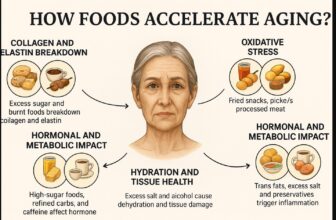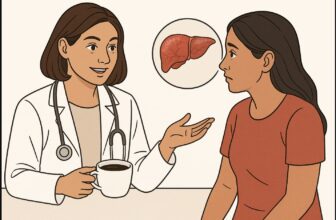In today’s world, ultra-processed foods have become a regular part of many kids’ diets. With convenient snacks like chips, cold drinks, and ready-to-eat meals (noodles, pasta) always within reach, it’s easy to overlook the impact these foods can have on your health.
While they may seem harmless at first, the effects of consuming ultra-processed foods can be far-reaching, affecting your body in ways you might not even notice. From energy crashes to long-term health issues, it’s important to understand what these foods are doing to your body and how you can make healthier choices.
In this listicle, we’ll explore 13 things ultra-processed foods can do to your body over time, and how you can break free from this cycle for better health.
Ultra-Processed Foods Immediate Effects (Days of Consumption)
1. Sugar Crashes and Energy Dips
Eating ultra-processed foods, especially those packed with sugar, can give you a quick burst of energy. However, it doesn’t last long. After a sugar high, you’ll experience a crash, leaving you feeling tired, sluggish, and unfocused. This can seriously affect your mood and concentration, making it harder to focus on schoolwork or enjoy outdoor activities.
2. Bad Digestive Health
Ultra-processed foods are often loaded with artificial additives, preservatives, and low-quality ingredients that can mess with your digestive system. You might experience bloating, gas, or stomach discomfort after consuming these foods. These signs are your body’s way of telling you that something’s not right inside.
3. Increased Cravings for More Processed Foods
One of the biggest problems with ultra-processed foods is how they make you crave more. These foods are designed to be super tasty, making your brain want more and more. The more you eat, the harder it becomes to break the cycle, and before you know it, you’re hooked on unhealthy snacks and drinks.
4. Tooth Decay and Cavities
Sugary foods and drinks are one of the leading causes of tooth decay. When you eat these foods, the sugar interacts with the bacteria in your mouth, forming acids that can damage your teeth and lead to cavities. This is especially concerning for kids, as their teeth are still developing.
Processed Foods Medium-Term Effects (Months of Consumption)
5. Weight Gain and Obesity Risks
Regularly consuming ultra-processed foods can lead to weight gain over time. These foods are typically high in calories, unhealthy fats, and added sugars, all of which contribute to an increase in body fat. This weight gain can eventually lead to obesity, which is a serious risk factor for many health problems.
6. Poor Skin Health and Acne
Have you noticed breakouts after indulging in junk food? Ultra-processed foods, especially those with a high sugar and fat content, can trigger acne and other skin problems. The combination of unhealthy fats and sugar can increase inflammation in your skin, leading to pimples, redness, and other issues.
7. Weakened Immune System
Eating too many ultra-processed foods can weaken your immune system. These foods lack essential nutrients, like vitamins and minerals, which are necessary for your body to fight off infections. As a result, you may get sick more often, and your body might take longer to recover.
8. Hormonal Imbalance and Growth Concerns
Ultra-processed foods often contain artificial chemicals and hormones that can disrupt your body’s natural hormone balance. This can interfere with your growth, especially during puberty. It may even affect your mood and energy levels.
Ultra-Processed Foods Long-Term Effects (Years of Consumption)
9. Increased Risk of Chronic Diseases (Heart Disease, Diabetes)
The more you consume ultra-processed foods, the greater your risk of developing chronic diseases later in life. These foods are high in sugar, salt, and unhealthy fats, all of which contribute to the development of conditions like heart disease and type 2 diabetes. The earlier you start making healthier food choices, the better your chances of avoiding these diseases.
10. Mental Health Issues
Believe it or not, your diet plays a huge role in your mental health. Studies have shown that eating ultra-processed foods regularly can increase your risk of developing anxiety, depression, and poor concentration. These foods lack the nutrients needed to keep your brain healthy, and in the long run, they can affect how you think and feel.
11. Weakened Bones and Joint Issues
Ultra-processed foods, especially those high in sugar and artificial ingredients, can interfere with your body’s ability to absorb important nutrients like calcium. Calcium is essential for strong bones and teeth. Without it, you may face a higher risk of bone-related issues, like osteoporosis, later in life.
12. Increased Risk of Early Puberty
Some studies suggest that ultra-processed foods can lead to earlier onset of puberty, especially in girls. Chemicals in processed foods, such as hormones and preservatives, can disrupt the body’s normal hormone levels, causing early development. This can lead to health complications later on.
13. Reduced Life Expectancy
While it might not seem obvious now, consuming ultra-processed foods regularly can actually reduce your life expectancy. Over time, the damage caused by poor nutrition, combined with the increased risk of chronic diseases, can lower your chances of living a long and healthy life.
How to Break the Addiction to Ultra-Processed Foods
Now that you know how harmful ultra-processed foods can be, you might be wondering how to break the addiction. Here are some practical tips to help you reduce your intake and make healthier food choices:
Healthy Alternatives
Start by swapping out processed snacks for healthier options. Instead of chips and sugary snacks, try fresh fruit, nuts, or homemade granola bars. These foods provide essential nutrients and will keep you feeling full and satisfied without the sugar crashes.
Making Better Food Choices
When you’re out shopping, take a moment to read food labels. Look for items with fewer additives, preservatives, and unhealthy fats. The less processed, the better. If you can’t pronounce an ingredient, it’s probably best to avoid it.
Role of Parents and Schools in Creating Awareness
Parents and schools play a crucial role in helping kids make healthier food choices. Parents can help by packing nutritious lunches and limiting junk food at home. Schools can offer healthier snack options and educate students on the dangers of ultra-processed foods.
Summary – Understanding the Impact of Processed Foods
Ultra-processed foods may be convenient, but they come with serious consequences for your health, both in the short term and long term. From weight gain to mental health issues, the effects can be harmful and long-lasting.
It’s time to make healthier food choices, reduce our dependency on processed foods, and take care of our bodies. Start small, make one change at a time, and encourage your friends and family to join you in making the switch to a healthier, more natural way of eating.





